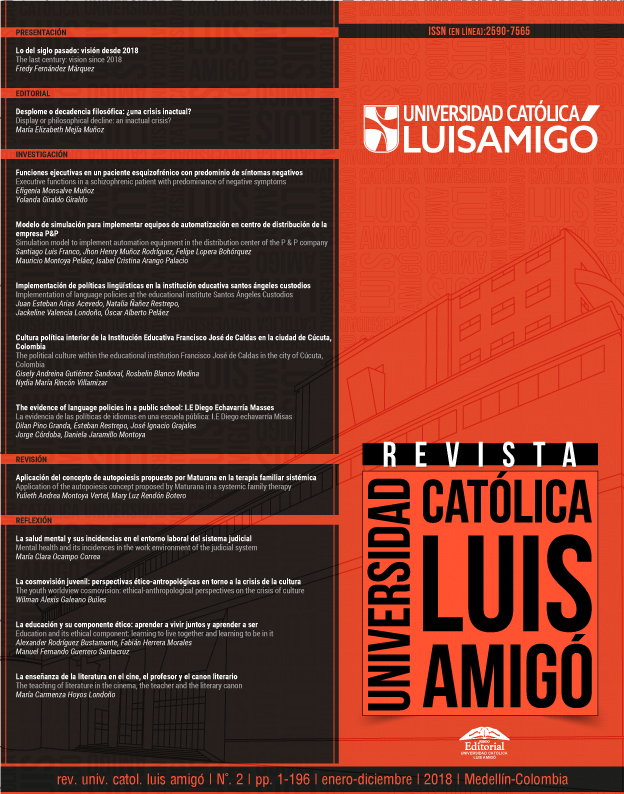Implementation of language policies at the educational institute Santos Ángeles Custodios
DOI:
https://doi.org/10.21501/25907565.3044Keywords:
National English Exam, Strengthening of English, Globalization, Implementation of Language Policies, Instrumentalization of the language, Linguistic politic.Abstract
Language policies have been a controversial issue regarding the teaching-learning process of English in Colombia. Some authors have mentioned the implications that globalization and the adoption of external agendas have had in the implementation process in the classrooms. The schools and the creators of the policy have tried to design plans for the improvement of the educational conditions and these have had an impact on national exams such as the Saber Tests 11. The purpose of this study is to analyze how the Santos Ángeles Custodios Educational Institution is implementing language policies to achieve good results in the national English exams. The participants in this study were three students, one English teacher and one manager. The categories assigned for the analysis of the data were the linguistic policies, their implementation process and their impact. It was proved that linguistic policies are being implemented to obtain good results at the institution, which can be evidenced through the strengthening of English since primary school, the teaching profile, the use of texts and the instrumentalization of the language. To conclude, English has a great importance in the institution which has opened a door there into new alternatives with respect to English which indicates that there are processes of appropriation.Downloads
References
yala Zárate, J., & Álvarez, J. (2005). A perspective of the implications of the Common European Framework implementation in the Colombian socio-cultural context. Colombian Applied Linguistics Journal, (7), 7-26. Retrieved from https://revistas.udistrital.edu.co/ojs/index.php/calj/article/view/162
Bell, J. (2014). Doing Your Research Project: A guide for first-time researchers. McGraw-Hill Education (UK).
Bonilla Carvajal, C. A., & Tejada-Sánchez, I. (2016). Unanswered Questions in Colombia’s Foreign Language Education Policy. Profile Issues in Teachers Professional Development, 18(1), 185-201. doi: http://dx.doi.org/10.15446/profile.v18n1.51996
Cámere, E. (2009) La relación profesor-alumno en el aula. Retrieved from https://entreeducadores.com/2009/08/01/la-relacion-profesor-alumno-en-el-aula/
Cárdenas, M. L. (2006). Bilingual Colombia: Are we ready for it? What is needed. In 19th Annual EA Education Conference.
Comfort, T., & Tinsley, T. (2012) Lessons from abroad: international review of primary languages. CfBT Education Trust. UK.
Congreso de la República de Colombia. (8 de febrero de 1994). Por la cual se expide la ley general de educación. [Ley 115 de 1994]. Colombia.
Congreso de Colombia. (12 de julio de 2013). “Por medio de la cual se modifican los artículos 13,20,21,22,30 y 38 de la Ley 115 de 1994 y se dictan otras disposiciones ley de Bilingüismo”. [Ley 1651 de 2013]. Colombia.
Glesne, C. (2015). Becoming qualitative researchers: An introduction. Pearson.
Guerrero, C. H. (2008). Bilingual Colombia: What does It Mean to Be Bilingual within the Framework of the National Plan of Bilingualism? Profile Issues in Teachers Professional Development, 10(1), 27-46. Retrieved from https://revistas.unal.edu.co/index.php/profile/article/view/10563
Guerrero Nieto, C. H., & Quintero Polo, Á. H. (2009). English as a neutral language in the Colombian National Standards: A constituent of dominance in English language education. Profile Issues in Teachers Professional Development, 11(2), 135-150.
Guion, L. A., Diehl, D. C., & McDonal, D. (2002). Triangulation: Establishing the validity of qualitative studies. University of Florida Cooperative Extension Service, Institute of Food and Agricultural Sciences, EDIS.
Gulsecen, S., & Kubat, A., (2006). Teaching ICT to teacher candidates using PBL: A qualitative and quantitative evaluation. Educational Technology & Society, 9(2), 96-106.
Ingersoll, R., Merrill, L., & May, H. (2012) Retaining Teachers How Preparation Matters. Educational Leardership, 69(8), 30-34.
Levinson, B. A., Sutton, M., & Winstead, T. (2009). Education policy as a practice of power: Theoretical tools, ethnographic methods, democratic options. Educational Policy, 23(6), 767-795. doi: https://doi.org/10.1177/0895904808320676
Maturana, L. (2011). La Enseñanza del Inglés en Tiempos del Plan Nacional de Bilingüismo en Algunas Instituciones Públicas: Factores Lingüísticos y Pedagógicos. Colombian Applied Linguistics Journal, 13(2), 74-87.
Nation, I. S. P., & John Macalister (2010). Language Curriculum Design. New York & London: Routledge.
Ocampo, J. F. (2002). La educación colombiana: historias, realidades y retos. Bogotá: Cooperativa Editorial Magisterio
Peláez, O., & Usma, J. (2017). The crucial role of educational stakeholders in the appropriation of foreign language education policies: A case study. Profile Issues in Teachers’ Professional Development, 19(2), 121-134. doi: http://dx.doi.org/10.15446/profile.v19n2.57215.
Presidencia de la República de Colombia. (2 de noviembre de 2006). Por el cual se reglamenta la organización y funcionamiento de los programas de educación para el trabajo y el desarrollo humano en el área de idiomas y se establecen las condiciones mínimas de calidad. [Decreto Nacional 3870 de 2006, Diario Oficial No. 46440]. Colombia.
Ricento, T. (Ed.). (2009). An introduction to language policy: Theory and method. Blackwell Publishing
Sánchez, A. C., & Obando, G. (2008). Is Colombia ready for “bilingualism”? Profile Issues in Teachers Professional Development, 9(1), 181-195. Retrieved from https://revistas.unal.edu.co/index.php/profile/article/view/10715/11186
Spolsky, B. (2004). Language policy. Cambridge: Cambridge University Press.
Stronge, J & Tucker, P. (2005) Linking Teacher Evaluation and Student Learning. The Power of an Effective Teacher and Why We Should Assess It. Association for Supervision and Curriculum Development. Virginia, USA.
Usma, J. (2009). Education and language policy in Colombia: Exploring processes of inclusion, exclusion, and stratification in times of global reform. Profile Issues in Teachers Professional Development, 11(1), 123-142. Retrieved from https://revistas.unal.edu.co/index.php/profile/article/view/10551
Usma, J. (2015). From Transnational Language Policy Transfer to Local Appropriation: The case of the National Bilingual Program in Medellín, Colombia. Deep University Press: Wisconsin, USA.
Valencia, M. (2013). Language policy and the manufacturing of consent for foreign intervention in Colombia. Profile Issues in Teachers Professional Development, 15(1), 27.
Walsham, G. (1995). The Emergence of Interpretivism in IS Research. Information Systems Research, 6(4), 376-394. doi: 10.1287/isre.6.4.376
Zainal, Z. (2007). Case study as a research method. Jurnal Kemanusiaan, 9.
Downloads
Published
How to Cite
Issue
Section
License
PROPIEDAD INTELECTUAL
Los autores son moral y legalmente responsables del contenido de sus artículos, así como del respeto a los derechos de autor. Por lo tanto, éstos no comprometen en ningún sentido a la Universidad Católica Luis Amigó.
La reproducción de los artículos se regirá conforme a lo descrito en http://creativecommons.org/licenses/by-nc-sa/4.0/

